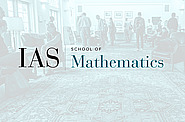Seminars
May
13
2014
Computer Science/Discrete Mathematics Seminar II
A central limit theorem for Gaussian polynomials and deterministic approximate counting for polynomial threshold functions
10:30am|West Bldg. Lect. Hall
Apr
29
2014
Computer Science/Discrete Mathematics Seminar II
A central limit theorem for Gaussian polynomials and deterministic approximate counting for polynomial threshold functions
10:30am|S-101
Apr
28
2014
Computer Science/Discrete Mathematics Seminar I
Search games and Optimal Kakeya Sets
Yuval Peres
11:15am|S-101
Apr
22
2014
Computer Science/Discrete Mathematics Seminar II
Results and open problems in theory of quantum complexity
10:30am|S-101
Apr
21
2014
Computer Science/Discrete Mathematics Seminar I
True Randomness: Its Origin and Expansion
Yaoyun Shi
11:15am|S-101
Apr
15
2014
Computer Science/Discrete Mathematics Seminar II
IP = PSPACE via error correcting codes
10:30am|S-101
Apr
14
2014
Computer Science/Discrete Mathematics Seminar I
Local Correctability of Expander Codes
Brett Hemenway
11:15am|S-101
Apr
08
2014
Computer Science/Discrete Mathematics Seminar II
Do NP-Hard Problems Require Exponential Time?
10:30am|S-101
Apr
07
2014
Computer Science/Discrete Mathematics Seminar I
Progress on algorithmic versions of the Lovasz Local Lemma
11:15am|S-101
Apr
01
2014
Computer Science/Discrete Mathematics Seminar II
Byzantine Agreement in Expected Polynomial Time
10:30am|West Bldg. Lect. Hall
